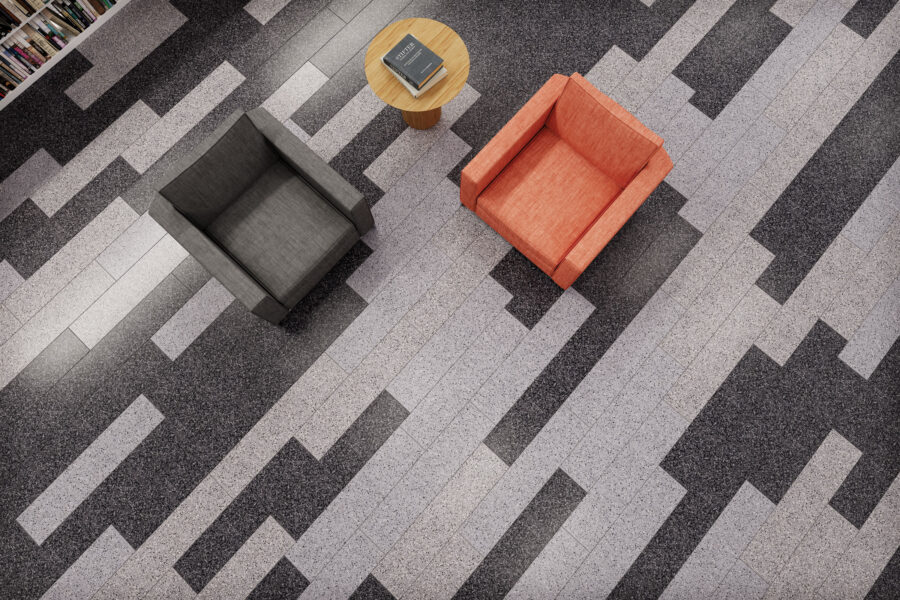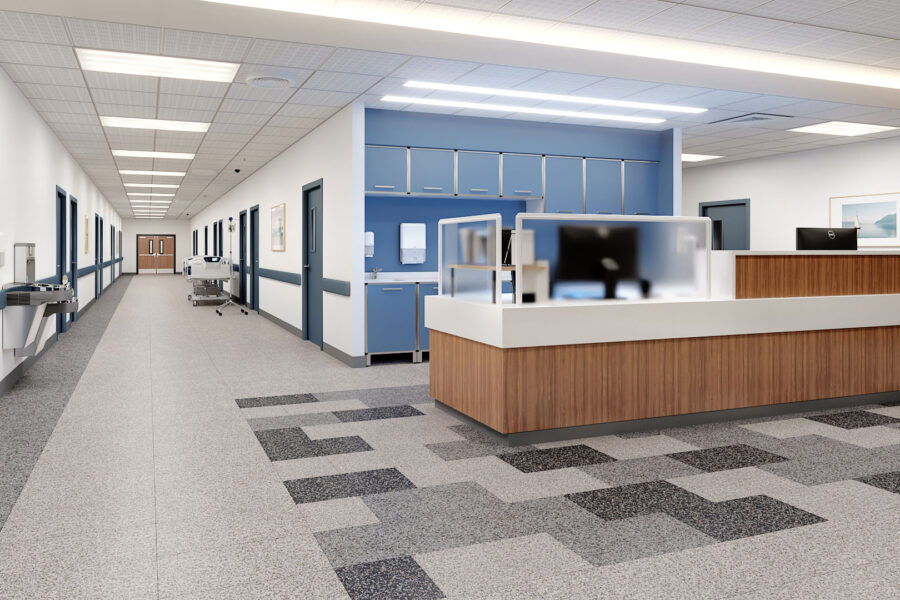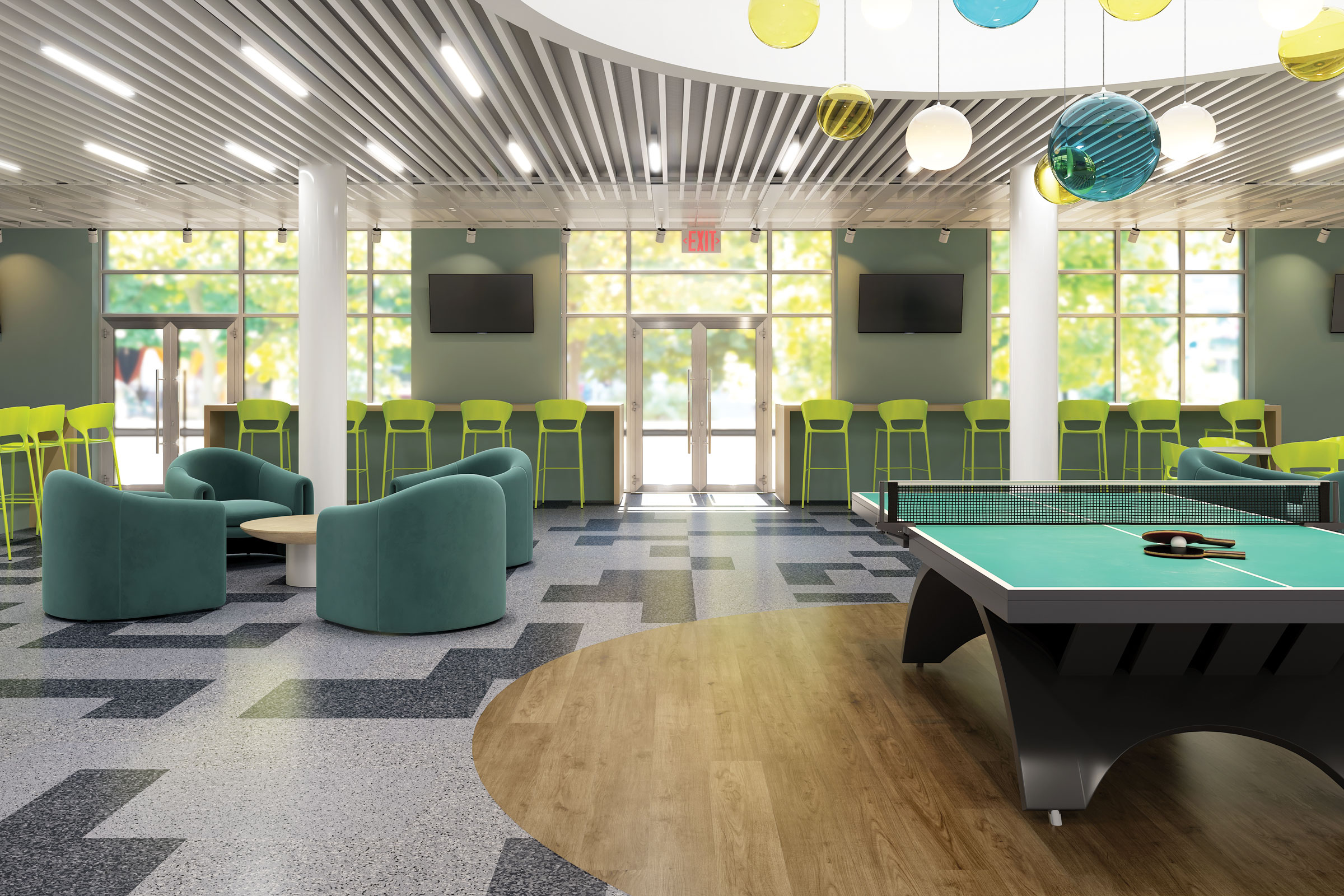Story at a glance:
- Many architects are looking for ways to design better—from the products they specify in their projects to the overall life of a building they design.
- Solutions for a circular economy include REGUPOL’s impact sound insulation underlays, which also improve acoustics.
- REGUPOL is one of the world’s leading processors of recycled elastomers, used to create high-performance sports and safety flooring.
“Let’s change” is the motto behind REGUPOL’s sustainability strategy. “We see it as a call for all of us to take new paths, gear our actions toward conserving our environment and resources, and contribute to shaping market changes. We can no longer afford to wait and see. We have to change things now,” says Niels Pöppel, CEO of REGUPOL Germany. “We are more than happy to be miserly with our resources, because we have no other choice if future generations want to inherit a world worth living in. As a family enterprise, that’s the way we’ve been operating for seven decades.”
When REGUPOL started to process recycled materials from furniture production 70 years ago and used them to make judo mats, for example, many people didn’t talk about recycling or what happens to waste, says John Aten, vice president of sales and marketing REGUPOL America. Aten has been with REGUPOL Group for more than 30 years, and the industry has come a long way since those early days.
“We have contributed to a significant change in the way the circular economy is viewed today. It is now seen as the economic model of the future,” Aten says. “We see ourselves as a driver of the circular economy and are living up to our claim of being a quality and service leader.”
Over seven decades REGUPOL has continued to innovate—especially in the realm of commercial flooring. Their products are now supplied to more than 130 countries. “Over the past few years we have not only developed new countries for our REGUPOL products, we have also greatly expanded our product ranges. Acoustics, sports, building protection, commercial flooring, and load securing now contribute to an extremely broad spectrum,” Aten says. “These product range expansions have taken place gradually, which has contributed to very healthy growth for the company as a whole. The majority of our products now have a recycled content of 75%, and the highest percentage is actually 95%.”
REGUPOL is one of the world’s leading processors of recycled elastomers, which are used to create the company’s high-performance sports and safety flooring, commercial resilient sheet and tile products, anti-slip mats for load securing, products for impact sound insulation and vibration isolation, and protective and separating layers for use in construction projects. Worldwide they recycle more than 90,000 tons of elastomers.
Design for the Circular Economy

Photo courtesy of Regupol
REGUPOL is a member of Initiative New Life in Germany, a collective of companies committed to recycling and the circular economy. Together the members work to demonstrate the benefits of products made from recycled tires at the end of their useful lives and encourage others to make similar sustainable commitments. This effort goes hand-in-hand with a 2020 forum launched for waste tire recycling called AZuR. AZuR was launched and is funded by the Federal Ministry for Education and Research of Germany.
“This rapidly growing network currently comprises some 60 partners—including companies, associations, colleges, universities, and environmental organizations,” Aten says of AZuR. “We at REGUPOL have been part of the innovation forum from the outset. AZuR aims to find ways and solutions for economically and ecologically feasible tire recycling.”
Many architects, too, are looking for ways to design better—from the products they specify in their projects to the overall life of a building they design. It’s not just about what happens to a chair when no one wants it, though that’s important, too, says Kimberly Dowdell, 2024 AIA President and architect at HOK. “Zooming out, the circular economy also can relate to the actual container—the building itself. That’s something that’s really tied into our sustainability ethos at HOK. How do we take what’s existing and help it to have a new life, whether it’s the scale of a chair or the scale of an entire building?”
If you want to build a sustainable building or live and work in a sustainable building, you should use sustainable building materials.
REGUPOL’s products are made of up to 95% recycled content, either from shredded and cleaned SBR tire rubber (100% post-consumer waste) or a combination of SBR tire rubber and vibrant EPDM color granules (post-industrial waste). “If you want to build a sustainable building or live and work in a sustainable building, you should use sustainable building materials,” Aten says.
REGUPOL also looks beyond raw materials—to product impact. “For example, we reduce impact sound and vibration noise in cities and urban environments to help create a more sustainable and healthier living space,” he says. “Our sports flooring and resilient commercial flooring products add shock absorption and energy return to the athlete as well as ergonomics for the customers and employees standing on the flooring.”
New Solutions

“We subject our products to extensive tests, we receive test reports from neutral testers, and we carry out very close internal tests ourselves. All for the benefit of our customers and for safe and sustainable products,” says REGUPOL’s John Aten. Rendering courtesy of REGUPOL
In January 2024 REGUPOL America launched REGUPOL upscale recycled rubber commercial flooring—the first of its kind micro-bevel plank and tile. REGUPOL upscale is available in 12 standard color combinations and features either a square or micro-bevel edge. Square-edged floors fit together flush, resulting in a sleek and seamless-looking transition. In contrast, the micro-bevel edge brings subtle texture and dimension to an interior space in an elegant way. The addition of a sealed finish can be applied at the factory or in the field, strengthening the tile’s defense against dirt and spills.
Upscale’s combination of design capability and performance benefits make it uniquely suited for education, corporate, retail, hospitality, and health care environments, Aten says. It is anti-slip and comfortable, with high acoustic performance and simple maintenance. The densely patterned tones can also help to mask scuffs and soil in busy commercial spaces.
Sustainable Accolades

Photo courtesy of Regupol
EPDs and HPDs continue to be an important element for backing up a company’s sustainability claims, as they detail products’ environmental and health impacts based on an ISO compliant life cycle assessment.
“REGUPOL is committed to product transparency, and EPDs and HPDs are the best way for us to effectively communicate the environmental impact of our products across product categories,” Aten says. “We are using these tools to drive innovation and product development and to reduce our Global Warming Potential throughout the full product life cycle. We also are using these tools to evaluate our recycled product architecture versus other non-recycled products and their overall global environmental impact.”
The company is also Cradle to Cradle Certified Bronze and has been recognized in the “Efficient Product” category as part of the NRW Environmental Economy awards. Every two years the Efficiency Agency NRW in Germany honors resource-efficient products and services of German-based companies. REGUPOL continues to focus on sustainability during its product development process, always striving to improve processes that reduce waste and energy consumption for our production.
The work is not done. “We have not yet reached the end of our journey,” Aten says. “Every day we work with our teams around the world to become better or to develop new products with our customers.”

